Aerospace manufacturers face mounting regulatory pressures as AS9100D standard requirements become increasingly complex and demanding. According to the Americas Aerospace Quality Group (AAQG) Spring 2024 meeting statistics, 96% of AS9100 series certified companies have fewer than 500 employees, demonstrating that AS9100 certification isn't just for aerospace giants; it's essential for suppliers at every level of the supply chain.
This comprehensive guide breaks down everything you need to know about AS9100 rev D requirements, from fundamental compliance components to advanced implementation strategies that transform regulatory obligations into competitive advantages for aviation, space, and defense organizations.
Understanding AS9100 Certification Fundamentals
AS9100 certification represents the gold standard for aerospace quality management systems, building upon ISO 9001 foundations while addressing the unique safety, reliability, and regulatory demands of aviation, space, and defense industries. This internationally recognized standard provides a unified framework that eliminates conflicting customer requirements while ensuring consistent quality across global supply chains.
The AS9100 standard was developed by the International Aerospace Quality Group (IAQG) to address specific aerospace industry needs that weren't adequately covered by general quality management standards. Major aerospace manufacturers, including Boeing, Airbus, Lockheed Martin, and Northrop Grumman, require AS9100 compliance as a condition of doing business.
What does the AS9100 Standard mean for Aerospace Companies?
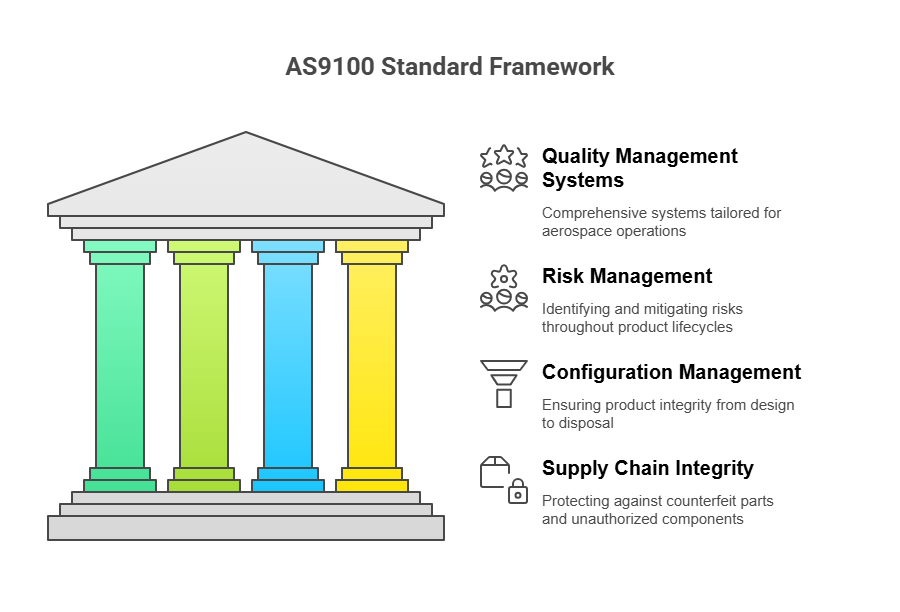
The AS9100 standard establishes comprehensive requirements for quality management systems specifically tailored to aerospace operations. Unlike generic quality standards, AS9100 addresses critical aerospace concerns, including product safety, configuration management, risk assessment, and regulatory compliance across multiple jurisdictions.
Organizations achieving AS9100 certification demonstrate their capability to consistently deliver products and services that meet customer specifications while satisfying statutory and regulatory requirements. The certification provides access to aerospace supply chains through the IAQG OASIS database, where certified suppliers are listed for easy identification by potential customers.
The standard emphasizes defect prevention, variation reduction, and waste elimination throughout aerospace supply chains, directly supporting the industry's zero-tolerance approach to quality failures. These requirements ensure that certified organizations implement robust processes capable of supporting mission-critical applications where failure is not an option.
Core AS9100 Requirements Every Organization Must Meet
AS9100 requirements encompass all ISO 9001:2015 elements while adding numerous aerospace-specific amplifications and requirements that address industry-unique challenges. According to SAE International's official AS9100D documentation, the standard includes additional aviation, space, and defense industry requirements, definitions, and notes beyond the base ISO 9001:2015 structure.
Key mandatory components include operational risk management, human factors consideration, design and development activities, and comprehensive supply chain management protocols. The standard requires organizations to establish, document, implement, and maintain quality management systems that address context, leadership, planning, support resources, operations, performance evaluation, and continuous improvement.
Risk management receives particular emphasis, requiring organizations to identify, assess, and mitigate risks throughout product lifecycles. Configuration management ensures product integrity from design through disposal, while counterfeit parts prevention protocols protect supply chain integrity against unauthorized components.
AS9100D vs Previous Revisions: Key Changes
AS9100 rev D incorporates significant updates aligned with ISO 9001:2015 while introducing new aerospace-specific requirements based on industry feedback and evolving regulatory needs. Released on September 20, 2016, the revision adopts the Annex SL structure, enabling better integration with other management system standards that organizations may implement.
Key changes include enhanced risk management requirements, expanded context of organization clauses, and strengthened interested parties identification processes. The revision clarifies terminology from "Aerospace Industry" to "Aviation, Space and Defense Organizations," broadening applicability while maintaining industry focus.
AS9100 revision D emphasizes process-based approaches over procedural documentation, encouraging organizations to focus on effectiveness rather than compliance alone. Leadership engagement requirements have been strengthened, ensuring top management actively participates in quality system development and maintenance.
Streamline Your AS9100D Certification with BPRHub – Automate compliance workflows, reduce audit risks, and accelerate certification success.
📍 Book a Demo
📧 hello@bprhub.com
Essential AS9100D Certification Requirements Breakdown
AS9100D certification requires organizations to demonstrate systematic implementation of comprehensive quality management principles specifically designed for aerospace operations. The certification process involves rigorous assessment of documentation, implementation, and effectiveness across all organizational functions that impact product or service quality.
Certification bodies accredited by IAQG conduct multi-stage audits evaluating organizational capability to consistently meet customer and regulatory requirements while maintaining a continuous improvement focus. The process typically requires 6-18 months, depending on organizational size, complexity, and existing quality system maturity.
Mandatory AS9100 Quality Management System Components
AS9100 quality management system components integrate seamlessly to create comprehensive quality infrastructures supporting aerospace manufacturing and service operations. Each component addresses specific industry requirements while maintaining compatibility with broader organizational objectives and ISO 9001 foundations.
Documentation requirements under the AS9100D standard extend beyond traditional quality manuals to encompass comprehensive process documentation, risk assessments, configuration management records, and regulatory compliance evidence. The standard emphasizes documented information that supports process effectiveness rather than bureaucratic compliance.
Organizations must maintain quality policies, objectives, procedures, work instructions, and records that demonstrate conformity to standard requirements and customer specifications. Documentation must be controlled, accessible, and maintained current throughout organizational changes and process improvements.
Process control standards require organizations to implement systematic approaches to planning, controlling, and monitoring processes that affect product quality and regulatory compliance. This includes production processes, service delivery, design and development, and support processes essential to quality system effectiveness.
Risk management protocols represent the cornerstone requirements of the AS9100D standard, reflecting the aerospace industry's emphasis on proactive risk identification and mitigation. Organizations must implement systematic approaches to identifying, assessing, prioritizing, and controlling risks throughout product and service lifecycles.
Aerospace Quality Standards Integration
Aerospace quality standards integration ensures organizations address multiple regulatory frameworks and customer requirements through unified quality management approaches. This integration eliminates duplicate efforts while ensuring comprehensive compliance with applicable requirements across different aerospace sectors.
Product safety requirements under the AS9100D standard address the critical nature of aerospace products where failures can result in loss of life, mission failure, or significant economic impact. Organizations must implement systematic approaches to identifying, assessing, and controlling safety risks throughout product lifecycles.
Configuration management ensures product integrity and traceability throughout design, development, production, and service lifecycles. Organizations must implement systematic approaches to identifying, controlling, documenting, and verifying product configurations at all lifecycle stages.
Counterfeit parts prevention protocols address critical aerospace industry concerns regarding unauthorized, fraudulent, or non-conforming components entering supply chains. Organizations must implement comprehensive systems to prevent, detect, and respond to counterfeit parts risks throughout procurement and manufacturing processes.
AS9100 Audit Process and Certification Steps
AS9100 audit processes follow structured approaches designed to evaluate organizational capability to meet standard requirements while maintaining focus on effectiveness and continuous improvement. The process includes multiple stages, each building upon previous assessments to provide a comprehensive evaluation of quality management system implementation.
Certification audits are conducted by accredited certification bodies using qualified auditors with aerospace industry experience and AS9100 knowledge. The process typically spans several months and requires significant organizational preparation and resource commitment.
Pre-Audit Preparation for AS9100 Certification Process
AS9100 certification process preparation requires systematic organizational assessment and improvement activities to ensure readiness for formal certification audits. Preparation typically requires 6-18 months, depending on existing quality system maturity and organizational commitment to implementation.
Gap analysis procedures identify differences between existing organizational practices and AS9100D standard requirements, providing roadmaps for implementation planning and resource allocation. The analysis should evaluate documentation, implementation, and effectiveness across all quality management system elements.
Internal audit requirements ensure organizations develop the capability to assess quality management system effectiveness and compliance with AS9100 requirements before engaging external certification bodies. BPRHub provides comprehensive AS9100 internal auditor training programs that develop organizational capability while ensuring audit program effectiveness.
Management review protocols ensure top management actively participates in quality management system oversight and improvement while demonstrating commitment to AS9100 certification maintenance. Reviews must be conducted at planned intervals with documented inputs, decisions, and actions.
AS9100 Auditor Certification and External Audits
AS9100 auditor certification ensures qualified personnel conduct certification assessments with appropriate aerospace industry knowledge and auditing competence. Lead auditors must meet IAQG qualification requirements and maintain currency through continuing education and audit experience.
Stage 1 documentation review evaluates quality management system documentation against AS9100D standard requirements to identify potential nonconformities and assess audit readiness. Stage 2 implementation assessment evaluates actual quality management system implementation and effectiveness through on-site audits examining processes, practices, and results.
Surveillance audit schedule maintains certification validity through periodic assessment of continued compliance and system effectiveness. Surveillance audits are conducted annually during the three-year certification cycle, with recertification audits required every three years.

AS9100 Training Requirements for Implementation
AS9100 training requirements ensure personnel throughout organizations understand standard requirements, implementation approaches, and their roles in maintaining certified quality management systems. Comprehensive training programs address awareness, competency, and specialized skills needed for effective system operation.
AS9100 internal auditor training develops organizational capability to assess quality management system effectiveness and compliance with standard requirements through systematic internal audit programs. AS9100 lead auditor training prepares qualified personnel to lead internal audit teams and potentially pursue external auditor certification.
Staff competency development ensures personnel throughout organizations possess the knowledge and skills needed to perform quality-related functions effectively while supporting AS9100 compliance objectives. Competency requirements should be defined for all positions affecting product or service quality.
AS9100 Quality System Implementation Guide
AS9100 quality system implementation requires systematic approaches that address standard requirements while supporting organizational objectives and customer satisfaction. Implementation planning should consider organizational readiness, resource requirements, and timeline constraints while maintaining focus on effectiveness.
Building Your Aerospace Quality Management System
Aerospace quality management system development requires an understanding of industry requirements, regulatory frameworks, and customer expectations that define performance criteria for aerospace suppliers. Systems must be designed to support both current operations and future growth while maintaining flexibility for changing requirements.
Process mapping requirements under the AS9100D standard ensure organizations understand and document relationships between processes that affect product quality and customer satisfaction. Quality objectives setting aligns organizational activities with customer requirements and strategic goals while providing measurable targets for performance improvement.
Resource allocation planning ensures adequate resources are available to implement and maintain AS9100 quality management systems effectively while achieving established quality objectives. Planning should address human resources, infrastructure, technology, and financial requirements.
AS9100 Quality Standards Compliance Monitoring
AS9100 quality standards compliance monitoring ensures organizations maintain conformity with standard requirements while identifying improvement opportunities and potential nonconformities before they impact customer satisfaction or certification status.
Performance metrics tracking provides objective evidence of quality management system effectiveness while supporting data-driven decision making and continuous improvement initiatives. Corrective action procedures ensure systematic investigation and resolution of nonconformities while preventing recurrence through root cause analysis.
Continuous improvement processes ensure quality management systems evolve to meet changing customer requirements, regulatory updates, and organizational growth while maintaining AS9100D standard compliance and certification status.
AS9100 Certification Cost Analysis and ROI
AS9100 certification cost analysis helps organizations understand investment requirements while developing business cases for certification pursuit and maintenance. Costs include direct certification expenses, internal implementation costs, and ongoing maintenance requirements over certification lifecycles.
Direct certification expenses include registration body fees, consultant costs, and training investment. Hidden implementation costs often exceed direct certification expenses but receive less attention during initial planning phases, including documentation development, system upgrades, and staff time investment.
Return on investment should be evaluated based on market access improvements, operational efficiency gains, customer satisfaction improvements, and competitive advantage development. Benefits typically exceed costs within 2-3 years for organizations committed to effective implementation.
AS9100 Aerospace Industry Applications
AS9100 aerospace applications span the complete spectrum of aviation, space, and defense industries, from original equipment manufacturers to component suppliers, maintenance organizations, and service providers. The standard provides unified quality requirements that support supply chain integration while addressing industry-specific needs.
Aerospace certifications portfolio integration enables organizations to leverage quality management system foundations to support multiple certification requirements efficiently. BPRHub's integrated approach to aerospace quality management enables organizations to address multiple standards simultaneously while reducing administrative overhead.
Supplier quality management requirements ensure aerospace organizations maintain control over purchased products and services while supporting supply chain quality objectives. This includes supplier evaluation criteria, performance monitoring systems, and risk assessment protocols that identify and evaluate supplier-related risks.
Maintaining AS9100 Certification Long-term
Quality management system maintenance requires sustained commitment to continuous improvement, regulatory compliance, and customer satisfaction over multi-year certification periods. Long-term success depends on embedding quality principles throughout organizational culture while maintaining system effectiveness.
Compliance monitoring strategies ensure organizations maintain conformity with AS9100D standard requirements while identifying improvement opportunities and potential issues before they impact certification status or customer satisfaction. Annual management review requirements ensure top management maintains active involvement in quality management system oversight.
Continuous improvement integration ensures quality management systems evolve to meet changing customer requirements, regulatory updates, and organizational growth while maintaining AS9100 certification and competitive advantage.
How BPRHub Helps with AS9100 Implementation
BPRHub's comprehensive Quality, Compliance, and Governance platform revolutionizes AS9100D standard implementation by centralizing all aerospace compliance requirements within a unified, intelligent system that transforms complex regulatory obligations into streamlined competitive advantages.
Our platform addresses the unique challenges faced by aerospace organizations implementing AS9100 requirements through automated workflows, integrated documentation systems, and real-time compliance monitoring that ensures continuous audit readiness while reducing administrative overhead.
BPRHub's Unified Compliance Framework manages over 30 regulatory standards simultaneously, enabling organizations to address AS9100 certification requirements alongside ISO 9001, ISO 14001, ISO 45001, and other applicable standards through integrated approaches that eliminate duplicate efforts.
The platform's intelligent automation captures quality data in real-time, generates regulatory reports automatically, and provides predictive analytics that identify potential compliance issues before they impact operations or certification status. This proactive approach reduces regulatory risk while freeing teams to focus on innovation and customer satisfaction.
Our aerospace-specific modules address critical AS9100D requirements, including risk management, configuration management, counterfeit parts prevention, and supplier quality management through integrated workflows that ensure comprehensive compliance while supporting operational efficiency.
Transform Aerospace Compliance into Competitive Advantage – Leverage BPRHub’s unified compliance framework to integrate AS9100D with ISO.
📍 Book a Demo
📧 hello@bprhub.com
Key Takeaways
→ AS9100D standard represents the global benchmark for aerospace quality management systems, with 96% of certified companies having fewer than 500 employees according to AAQG Spring 2024 meeting statistics
→ AS9100 certification provides essential market access to aerospace supply chains while demonstrating commitment to safety, quality, and regulatory compliance across aviation, space, and defense sectors
→ AS9100 requirements extend ISO 9001 foundations with numerous aerospace-specific amplifications addressing operational risk management, configuration management, and counterfeit parts prevention
→ AS9100 audit processes follow structured approaches, including gap analysis, internal audits, Stage 1 documentation review, and Stage 2 implementation assessment conducted by qualified aerospace auditors
→ AS9100 training requirements ensure organizational competency through comprehensive programs covering standard requirements, internal auditor development, and specialized aerospace applications
→ BPRHub's platform centralizes AS9100 implementation and maintenance through intelligent automation, integrated compliance monitoring, and unified management of multiple aerospace standards
Frequently Asked Questions
What are AS9100D standards?
AS9100D standards represent the latest revision of the international quality management system standard for aviation, space, and defense organizations, released on September 20, 2016. The standard incorporates all ISO 9001:2015 requirements while adding numerous aerospace-specific amplifications addressing operational risk management, configuration management, counterfeit parts prevention, and supply chain control. AS9100D emphasizes process-based approaches, risk management integration, and continuous improvement while maintaining compatibility with other management system standards through Annex SL structure adoption.
What are the key requirements of AS9100?
The key AS9100 requirements include all ISO 9001 elements plus aerospace-specific additions covering operational risk management, product safety assurance, configuration management throughout product lifecycles, and comprehensive supply chain control. Organizations must implement documented quality management systems addressing context, leadership, planning, support resources, operations, performance evaluation, and improvement. Critical aerospace additions include counterfeit parts prevention protocols, design verification and validation requirements, production process controls, and post-delivery support systems that ensure product safety and regulatory compliance.
What is the AS9100 certification for aerospace?
AS9100 certification for aerospace demonstrates organizational capability to consistently provide products and services meeting customer and regulatory requirements for aviation, space, and defense applications. Certification requires a comprehensive quality management system implementation verified through multi-stage audits conducted by IAQG-accredited certification bodies. Certified organizations receive three-year certificates with annual surveillance audits and gain access to aerospace supply chains through the OASIS database. Major aerospace manufacturers, including Boeing, Airbus, and defense contractors, require AS9100 certification as a condition of doing business.
What is the difference between AS9100 and AS9100D?
The difference between AS9100 and AS9100D reflects the evolution from AS9100C (2009) to the current revision, incorporating ISO 9001:2015 changes and aerospace industry feedback. AS9100D adopts the Annex SL structure, enabling better integration with other management system standards, emphasizing risk-based thinking throughout all processes, and strengthening leadership engagement requirements. The revision clarifies terminology from "Aerospace Industry" to "Aviation, Space and Defense Organizations" while enhancing the context of organization clauses, interested parties identification, and operational risk management protocols that address evolving aerospace industry needs.
Get insights that help you minimize risks and maximize profits.
Dive deeper into manufacturing compliance with our free resources.
We get it, compliance can get tough.
Here are some additional resources to help.
We get it, compliance can get tough. Here are some additional resources to help.
Get updates in your inbox

.svg)
%20(1).svg)
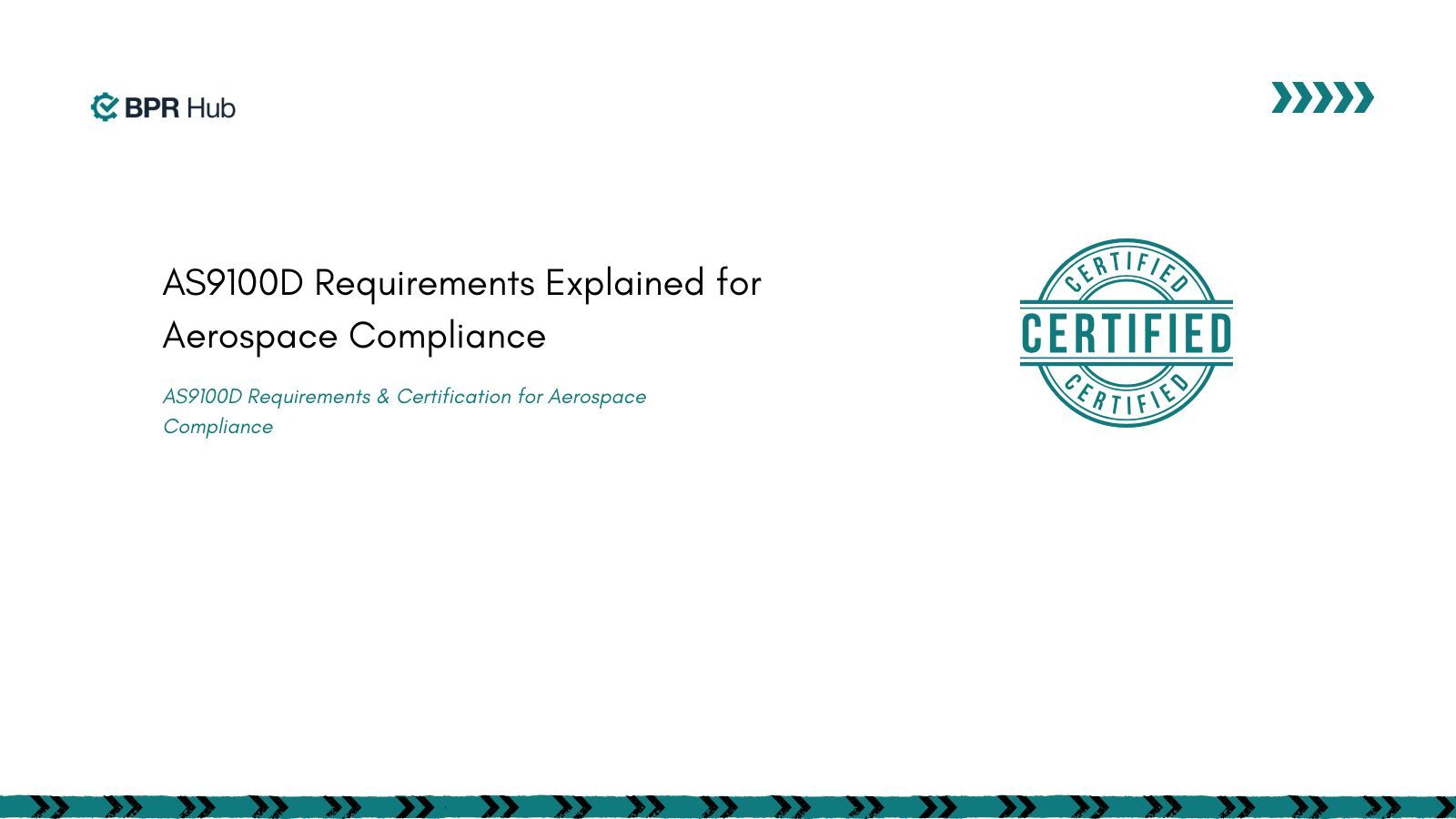

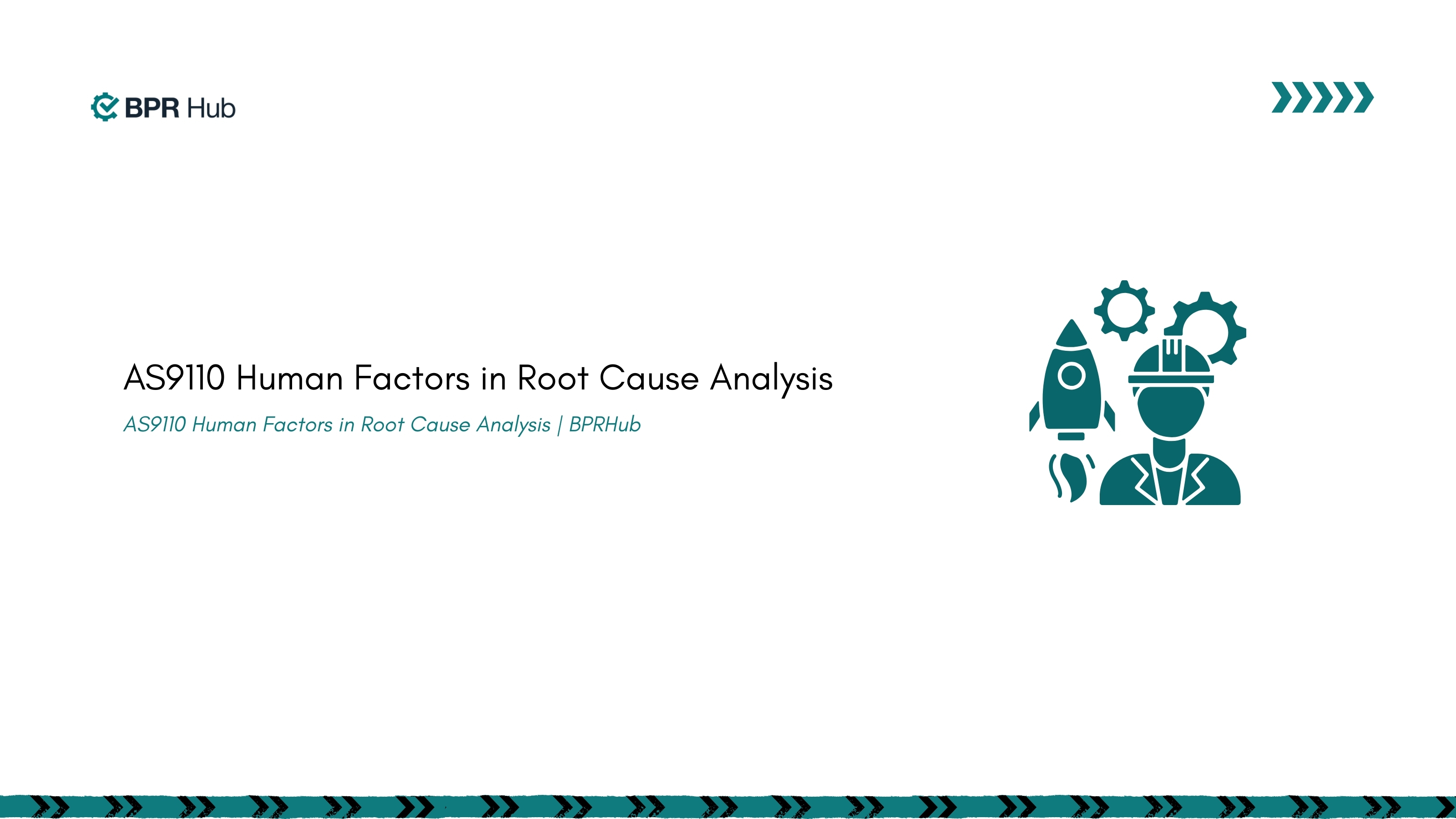
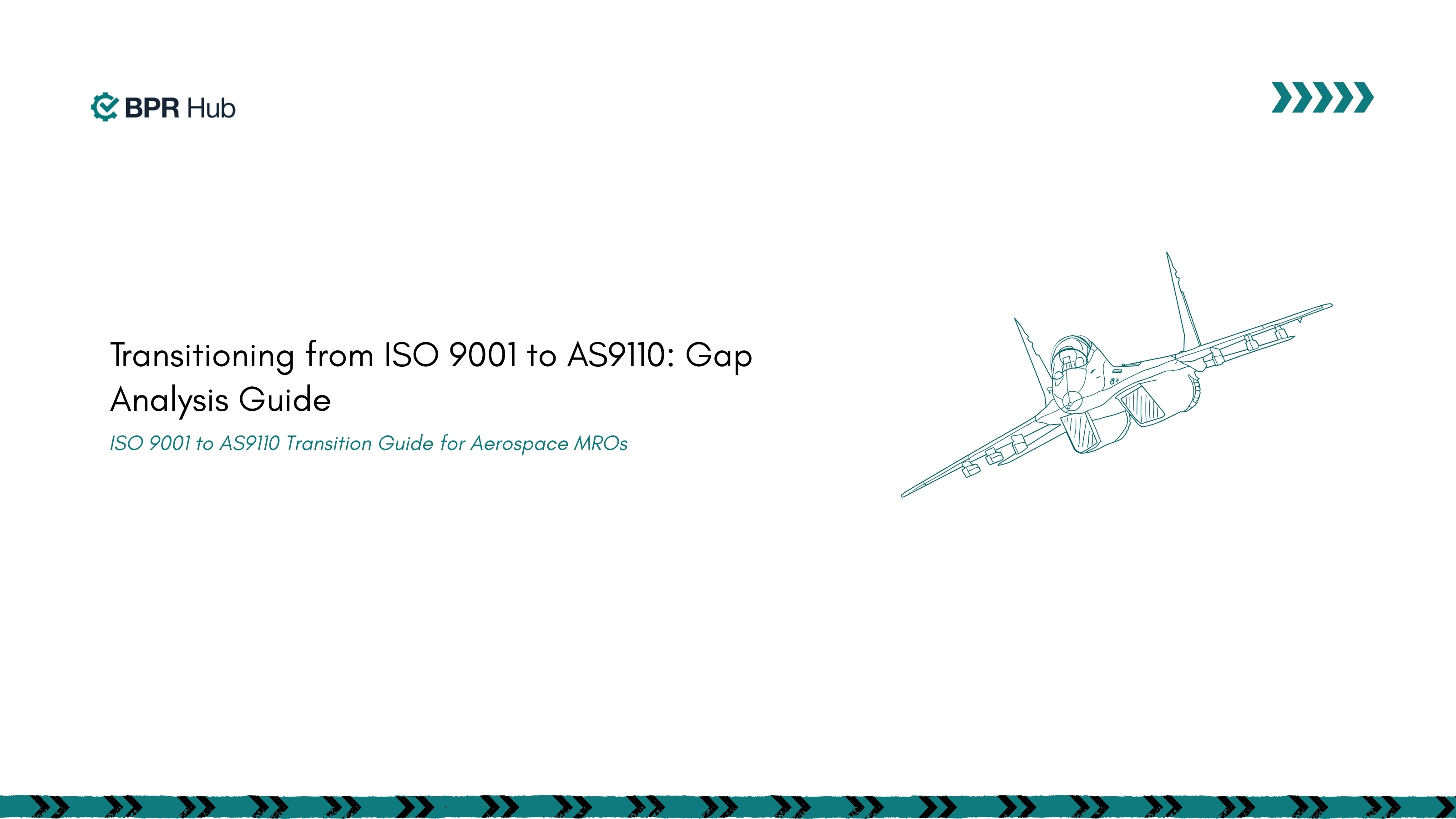
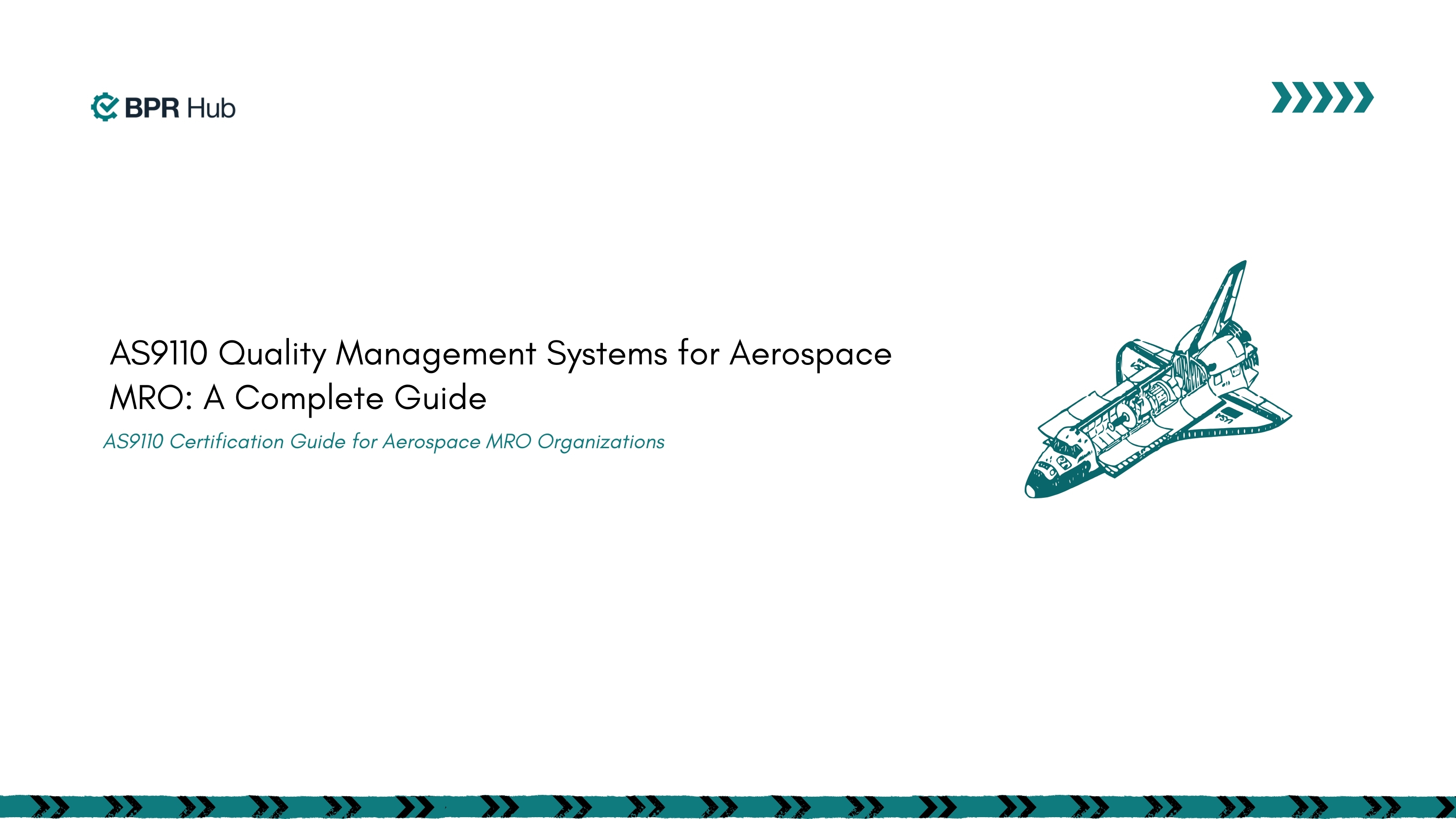
%20(1).svg)

.avif)

